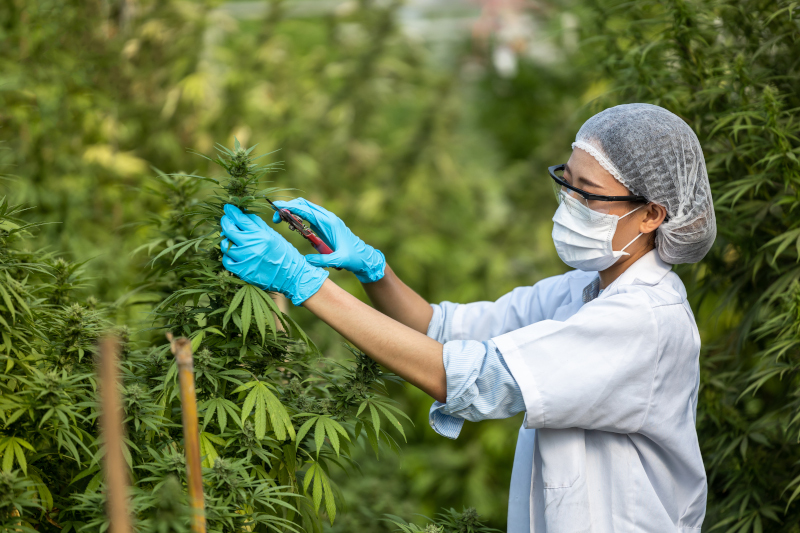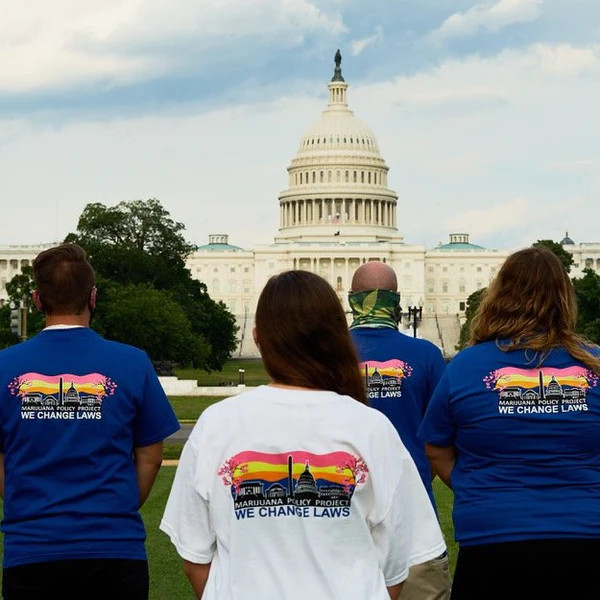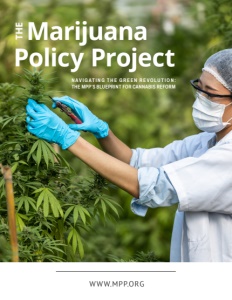Marijuana Policy Project (MPP)
Navigating the Green Revolution: The MPP’s Blueprint for Cannabis Reform
Charting a decade of progress, the Marijuana Policy Project outlines its vision of a regulated and inclusive cannabis landscape.
In the ever-evolving landscape of cannabis policy, the Marijuana Policy Project (MPP) stands as a beacon of change. With its clarion call, “We Change Laws!”, MPP is dedicated to reforming cannabis laws across the United States. Its mission is rooted in the belief that adults should not face jail or penalties for using cannabis.
Instead, it advocates for sensible regulation over prohibition, drawing parallels between the failures of alcohol prohibition and the harms of cannabis prohibition. As Karen O’Keefe, Director of State Policies at MPP, articulately puts it, “Just as alcohol prohibition failed, we think that cannabis prohibition has done a lot of harm. We support medical cannabis, and adult use legalization, and believe that those under 21 should face a civil fine, not jail time, for possession.”
Who stands behind this organization? A vast and diverse group, as O’Keefe describes: “We have about 300,000 people signed up to our email alerts and around 400,000 followers on social media. Our supporters range from libertarians to those motivated by social justice, cannabis consumers, medical users, and even those in the cannabis industry.”
This broad spectrum of supporters, which includes industry professionals, showcases the widespread belief in MPP’s mission. However, it’s crucial to note, as O’Keefe emphasizes, “We’re not a trade group, we’re not an industry group. We’re a broad-based organization that works for good policy and what we think is the better approach for cannabis.”

Advocacy and the Changing Landscape of Cannabis Policy
O’Keefe sheds light on the core objectives of the MPP, stating, “One of our primary goals is to legalize the consumption, purchase, and personal cultivation of cannabis for adults.” Beyond this fundamental aim, the organization is deeply invested in addressing the multifaceted repercussions of cannabis prohibition.
“We’ve been actively working on legislation, especially in Maryland, to ensure that individuals on parole, probation, or pretrial release aren’t penalized merely for cannabis use unless there’s a specific risk or reason.”
She further underscores the organization’s commitment to justice and equity, highlighting its efforts to “ensure that the odor of cannabis isn’t grounds for a search, support the expungement of records and release of those previously arrested for cannabis offenses, and promote diversity in licensing.”
The organization also provides technical assistance to cannabis business applicants and establishes community assistance funds. These measures aim to alleviate startup costs for social equity applicants, typically those from areas disproportionately affected by cannabis arrests.
“We’re also keen on fostering a workable industry, free from overly burdensome regulations and taxes, ensuring a competitive legal market as opposed to the illicit one,” she adds.
Addressing the public sentiment on cannabis legalization, O’Keefe references the Gallup poll, a long-standing barometer of public opinion. “Gallup has been gauging the American sentiment on cannabis legalization since the 70s. When I began my journey with MPP two decades ago, the support stood at 34%. Remarkably, over the past three years, this figure has soared to 68%,” she notes.
This shift isn’t confined to a particular demographic or political affiliation. “The support spans across Democrats, independents, and even a majority of Republicans. Every age group, as per the generational divisions, now exhibits majority support for legalization,” O’Keefe says, emphasizing the bipartisan and cross-generational momentum behind cannabis reform.
Navigating the Patchwork: State-by-State Cannabis Laws
Nevertheless, O’Keefe is quick to point out the complexities of navigating the diverse cannabis laws across states.
“While we’re advocating for federal legalization to address challenges arising from state-by-state discrepancies, we recognize the unique power states hold in matters of health and welfare,” she explains. She highlights the complications stemming from the federal illegality of cannabis, such as banking issues, federal tax burdens, and the absence of standardized rules on matters like pesticides.
However, she also sees a silver lining in this patchwork approach. “While the federal prohibition presents its challenges, allowing states to act as laboratories of democracy has its merits. Different states have adopted varied approaches, especially in social equity programs, providing a chance to discern what works and what doesn’t.” She mentions that while MPP offers model legislation, they understand and respect the unique priorities and political landscapes of each state.
Addressing the intricacies of cannabis use across state lines, O’Keefe points out, “Typically, the law of the state you’re in governs your actions. However, there are exceptions.” She cites South Dakota as an example where internal possession of cannabis is a crime, meaning having THC in one’s system after consuming in a legal state could technically be a violation.
Another concern is the unscientific DUI laws in some states that criminalize individuals for having cannabis in their system, even if they’re not impaired. “THC can remain in one’s system for weeks, making it possible for someone to face charges for a substance consumed legally elsewhere,” she warns.
“Unlike alcohol, where there’s a clear threshold for impairment, cannabis, and other drugs require a more comprehensive assessment,” she explains. The MPP advocates for a system where trained experts, combined with blood tests, determine impairment, ensuring that innocent individuals aren’t wrongfully convicted.
Packaging and Safety: Protecting the Younger Generation
When it comes to ensuring the safety of cannabis products, especially in households with children, O’Keefe underscores the importance of clear and secure packaging.
“Our model legislation mandates that cannabis products sold by retailers be housed in opaque, child-proof packaging. Additionally, a standardized THC warning symbol is essential, ensuring that even adult consumers are well-informed and can make conscious choices,” she explains.
She further emphasizes the dual responsibility of both the state and consumers in ensuring safety. “The bills we advocate for allocate a portion of the state’s cannabis tax revenue towards comprehensive education campaigns. Much like how parents are cautioned about household items like Tide Pods or certain cosmetics, which account for numerous child poisonings annually, they need to be equally vigilant about cannabis products,” she elaborates.

The Legislative Landscape and Economic Impacts of Cannabis Legalization
On the MPP’s legislative endeavors, O’Keefe underscores the MPPs focus on states like Delaware, Maryland, Hawaii, Louisiana, New Hampshire, Ohio, Pennsylvania, and South Carolina. “While we provide support for various bills in multiple states, our primary focus remains on these key regions,” she notes.
Discussing the organization’s structure, she shares, “I lead our state legislative department, and we have four other staffers assigned to specific states. Typically, they’re registered as contract lobbyists, engaging in in-person lobbying. We often employ contract lobbyists during legislative sessions to bolster our reach and relationships with legislators.” She also mentions the pivotal role of their CEO and President, Toi Hutchinson, in federal government affairs, given her rich experience as a former state legislator.
Turning to the economic implications of cannabis legalization, O’Keefe presents a compelling picture. “The cannabis industry has generated approximately 400,000 legal jobs, as reported by Leafly. Since the inception of legal sales in Colorado and Washington in 2014, states have amassed a total of $15 billion in tax revenue, with a staggering $3.7 billion in 2022 alone,” she states.
Beyond the direct economic benefits, O’Keefe touches upon the societal implications. “The legalization of cannabis has prevented countless individuals from facing the stigma of a criminal record, which can severely hamper future employment prospects. The economic repercussions of such stigmatization, coupled with potential job losses due to pretrial detentions, are profound,” she emphasizes.
Addressing concerns about workplace impairment post-legalization, O’Keefe cites a decade’s worth of data from Colorado. “The state has consistently reported a decline in lost costs, which represent the total cost of work-related injuries for worker’s comp claims. This suggests that legalization hasn’t led to increased workplace accidents or impairments,” she explains.
Charting the Course: MPP’s Vision for the Future of Cannabis
Looking ahead, O’Keefe notes the MPP’s commitment to fostering dialogue and disseminating knowledge. “Earlier this year, we marked our presence at the National Cannabis Festival in Washington DC, offering insights through speakers and booths. The pandemic prompted us to pivot towards virtual town halls, which have now become a staple in our outreach efforts, allowing members from various locations to engage,” she explains.
She also highlights the organization’s participation in numerous conferences, including the National Conference of State Legislators, and the association’s proactive approach to hosting in-person town halls, especially in states where its advocacy is most pronounced.
With an optimistic tone, O’Keefe outlines the organization’s priorities for the coming years.
“Given the necessary resources, we anticipate more states to transition from cannabis prohibition to legalization. We’re particularly hopeful about Ohio’s potential ballot initiative this November and are laying the groundwork for future legalization in states like Pennsylvania, Hawaii, and New Hampshire,” she states.
However, she also underscores the challenges ahead. “While popular support for legalization is evident, we’ve witnessed several initiatives falter recently. The remaining states present a more formidable challenge legislatively. To truly transform the cannabis landscape, we urge members to remain engaged and support our mission to replace the outdated prohibition model with a regulated system,” she emphasizes.
In a world where change is the only constant, the Marijuana Policy Project shows the power of advocacy, vision, and relentless effort. As the cannabis landscape continues to evolve, the MPP will undoubtedly play a pivotal role in shaping its future.
AT A GLANCE
Marijuana Policy Project
What: An organization dedicated to changing marijuana laws.
Where: Washington, D.C.
Website: www.mpp.org



